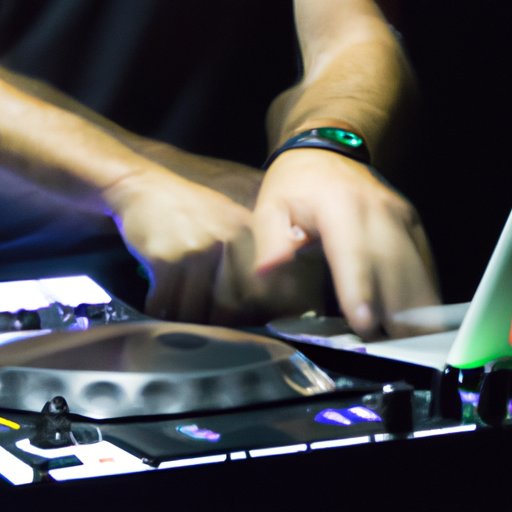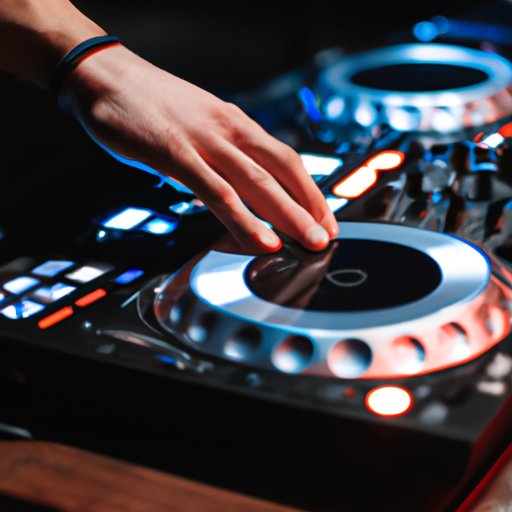
I. Introduction
DJing has become a massively popular profession in recent years, thanks to the rise of electronic dance music and the ever-expanding club and festival scene. But becoming a DJ is no easy feat. It takes time, dedication, and a lot of hard work to master the art of mixing music and delivering unforgettable performances.
That’s where this guide comes in. Whether you’re a complete beginner or an experienced musician looking to explore the world of DJing, this comprehensive article will teach you everything you need to know to become a successful DJ.
II. “7 Steps to Master the Art of DJing”
The following seven steps are the essential skills and knowledge required to become a skilled DJ:
1. Choosing the right equipment
The first step in the journey to becoming a DJ is to choose the right equipment. This includes the most important tool in a DJ’s arsenal: the mixer. There are different types of mixers on the market, from entry-level models to professional-grade mixers, and it’s important to choose one that meets your needs and budget. Other necessary equipment includes turntables or DJ controllers, headphones, and speakers.
2. Learning the basics of mixing
Mixing is the bread and butter of DJing. It’s the art of blending two or more tracks seamlessly, creating a smooth transition between songs. The key to good mixing is mastering beatmatching, which involves syncing the beats of two tracks to create a seamless transition. You’ll also need to understand phrasing, EQing, and other mixing techniques.
3. Knowing the music
A good DJ must have a comprehensive understanding of the music they play. This means listening to a wide range of tracks and genres, understanding the structure and dynamics of different genres, and keeping up with new releases and trends. Knowing your music also involves having a vast collection of tracks at your disposal and organizing them effectively.
4. Creating your own style
A great DJ has a unique style and sound. This involves developing your own musical taste and vision, experimenting with different genres and techniques, and gradually building your signature sound through practice and experience.
5. Practicing mixing techniques
Mixing is a skill that requires practice and repetition. The more time you spend honing your craft, the better you’ll become. It’s important to dedicate regular practice sessions to mastering different mixing techniques, experimenting with new tracks, and refining your overall sound.
6. Recording and sharing your mixes
Recording and sharing your mixes is a great way to showcase your skills and build a following. The internet is full of platforms and communities where DJs can upload their mixes, reach a wider audience, and engage with fans and fellow DJs.
7. Performing live
Performing live is the ultimate test of any DJ’s skills. It’s important to approach your live gigs with professionalism and a strong work ethic. You should always be prepared, know your audience, and deliver a high-energy performance that keeps the crowd dancing all night.
III. “The Beginner’s Guide to Becoming a DJ”
For beginners, learning to DJ can seem like a daunting task. Here are some essential steps to get started:
A. Introduction to DJing
Start by getting familiar with the art of DJing and the equipment required. Research the different types of mixers, turntables, and controllers available, and determine which ones best suit your needs and budget.
B. What beginners should know before starting
Before diving into DJing, it’s important to understand the basics of music theory and the fundamentals of sound. This will help you develop a good ear and make the most of your equipment.
C. Choosing the right equipment
Choose a DJ setup that meets your needs and budget. Consider investing in entry-level equipment to start, and upgrade as you gain experience and confidence.
D. Essential software and tools
Software programs like Serato, Traktor, and Virtual DJ are essential tools for modern DJs. They allow you to control your music library, beatmatch tracks, and create custom effects and loops.
E. Learning the basics of mixing
Start by learning the basics of beatmatching and phrasing, and gradually work your way up to more advanced mixing techniques. Practice regularly and seek feedback from more experienced DJs.
IV. “From Bedroom to Stage: How to Build Your DJ Career”
Building a successful DJ career requires a lot of hard work and dedication. Here are some essential steps to get started:
A. Networking with other DJs and industry professionals
Networking is key to success in the music industry. Attend industry events, connect with other DJs, and build relationships with agents, promoters, and club owners.
B. Building a following on social media
Social media is an essential tool for building a following and engaging with fans. Use platforms like Facebook, Instagram, and Soundcloud to share your mixes, communicate with followers, and stay up-to-date with industry news.
C. Creating a brand and identity
Develop a unique brand and identity that sets you apart from other DJs. This can include your choice of music, performance style, and visual aesthetic.
D. Marketing yourself as a DJ
Use a strong online presence, promotional materials, and live performance footage to market yourself as a DJ. Build a professional website and create a press kit that showcases your skills and experience.
E. Finding and booking gigs
Research venues, festivals, and events that align with your brand and style, and submit proposals and demos to promoters and booking agents.
F. Managing and promoting your events
When you do book gigs, it’s essential to manage and promote them effectively. This involves creating memorable performance experiences, working with venues and promoters to create effective promotional campaigns, and keeping fans engaged through social media and online marketing.

V. “Tips and Tricks for Aspiring DJs”
Here are some additional tips and tricks to help you on your journey to becoming a skilled DJ:
A. Practicing and refining your skills
Practice regularly and seek feedback from other DJs and mentors. Continually refine your skills and refine your technique.
B. Experimenting with different genres
Don’t be afraid to experiment with different styles and genres of music. This will help you broaden your musical knowledge and develop a more unique sound.
C. Picking and organizing your music library
Organizing your music library is essential for finding tracks quickly and efficiently during live performances. Use smart playlists and tags to categorize tracks for easy access.
D. Being open to feedback and criticism
Feedback and criticism can be invaluable for learning and improving as a DJ. Seek out constructive criticism and use it to develop your skills and technique.
E. Setting goals and tracking your progress
Set clear goals for your DJ career and track your progress consistently. This will help you stay motivated and focused on your long-term career goals.
VI. “The Ultimate Guide to Learning to DJ”
Here’s everything you need to know to start learning the art of DJing:
A. Introduction to DJing
Start by getting familiar with the basic concepts of DJing, such as beatmatching, phrasing, and mixing. Watch videos and tutorials online to become familiar with the equipment and processes involved.
B. Essential skills to master
Mastering beatmatching, EQing, and phrasing is essential for any DJ. Key skills to develop include track selection, beatmatching by ear, and learning how to use different effects and mixing techniques.
C. Types of equipment available
There are many different types of mixers, turntables, and controllers available, each with its own unique features and capabilities. Research the different options available and choose the one that best fits your needs and budget.
D. Choosing the right equipment for your needs
Consider your budget, experience level, and musical style when choosing equipment. It’s also important to invest in quality gear that can withstand the rigors of live performance.
E. Finding and attending DJ schools or courses
Attending a DJ school or course can be an effective way to accelerate your learning and develop your skills. Look for reputable schools and courses that offer hands-on experience and guidance from experienced professionals.
VII. “How to Get Your First Gig as a DJ”
Here’s how to land your first gig as a DJ:
A. Researching and targeting the right venues
Research different venues, clubs, and festivals that align with your musical style and brand. Reach out to them directly or submit proposals and demos through booking agents or promoters.
B. Building a strong portfolio and demo
Create a strong portfolio and demo that showcases your skills and experience. This can include recordings of live performances, mixtapes, and promotional materials.
C. Reaching out to promoters and booking agents
Send your portfolio and demo to promoters and booking agents in your area, and follow up with a polite and professional email or phone call.
D. Networking with other DJs and industry professionals
Networking is essential in the music industry. Attend events, connect with other DJs, and build relationships with industry professionals in your area.
E. Being professional and reliable
Once you land a gig, it’s important to approach it with professionalism and a strong work ethic. Be punctual, prepared, and deliver a high-energy performance that keeps the crowd dancing all night.
VIII. “Navigating the Music Industry: The Path to Becoming a Successful DJ”
Here’s how to navigate the complex music industry as a DJ:
A. Understanding the music industry and its trends
Stay up-to-date with music industry trends, developments, and emerging markets. This will help you build your brand, connect with industry professionals, and stay ahead of the curve.
B. Building a loyal fan base
Building a loyal fan base is essential for any successful DJ. Engage with fans through social media and live performances, and create memorable experiences that keep them coming back for more.
C. Creating and releasing your own music
Creating and releasing your own music is a great way to gain exposure, build a following, and develop your unique sound and identity as a DJ.
D. Collaborating with other artists
Collaborating with other artists and producers can expand your creative horizons and help you grow your network and fan base.
E. Developing a strong online presence
Develop a strong online presence through social media, website development, and other digital marketing channels. This will help you build your brand, connect with fans, and promote your music and live performances.
IX. Conclusion
In conclusion, becoming a skilled DJ is an ongoing journey that requires passion, dedication, and hard work. By following the steps outlined in this guide, you can develop your skills and build a successful career in the challenging and ever-changing world of DJing.
Remember to stay persistent, develop your own unique style, and never stop learning and growing as a DJ. With determination and the right mindset, you can achieve your goals and make your mark on the music industry.




